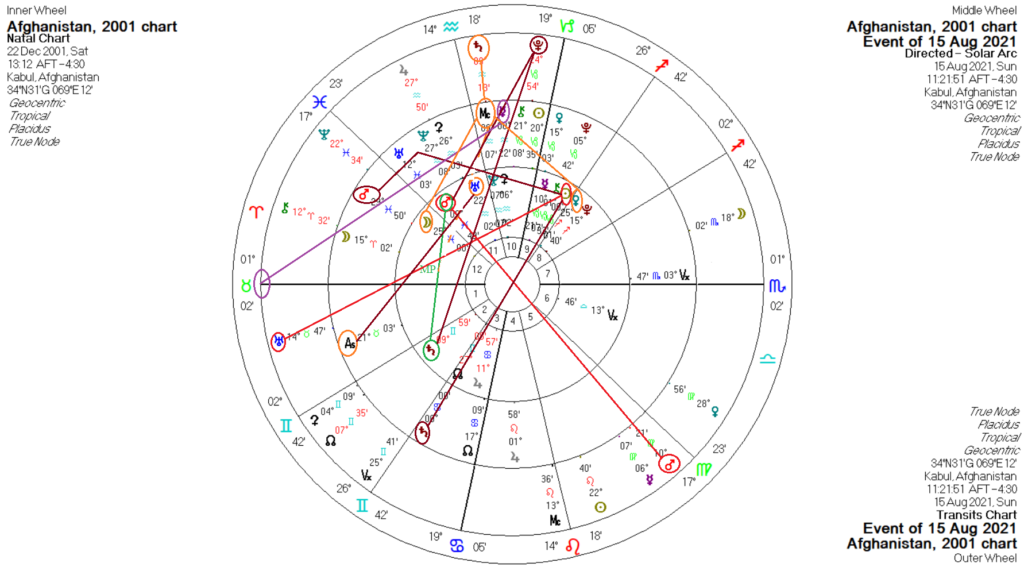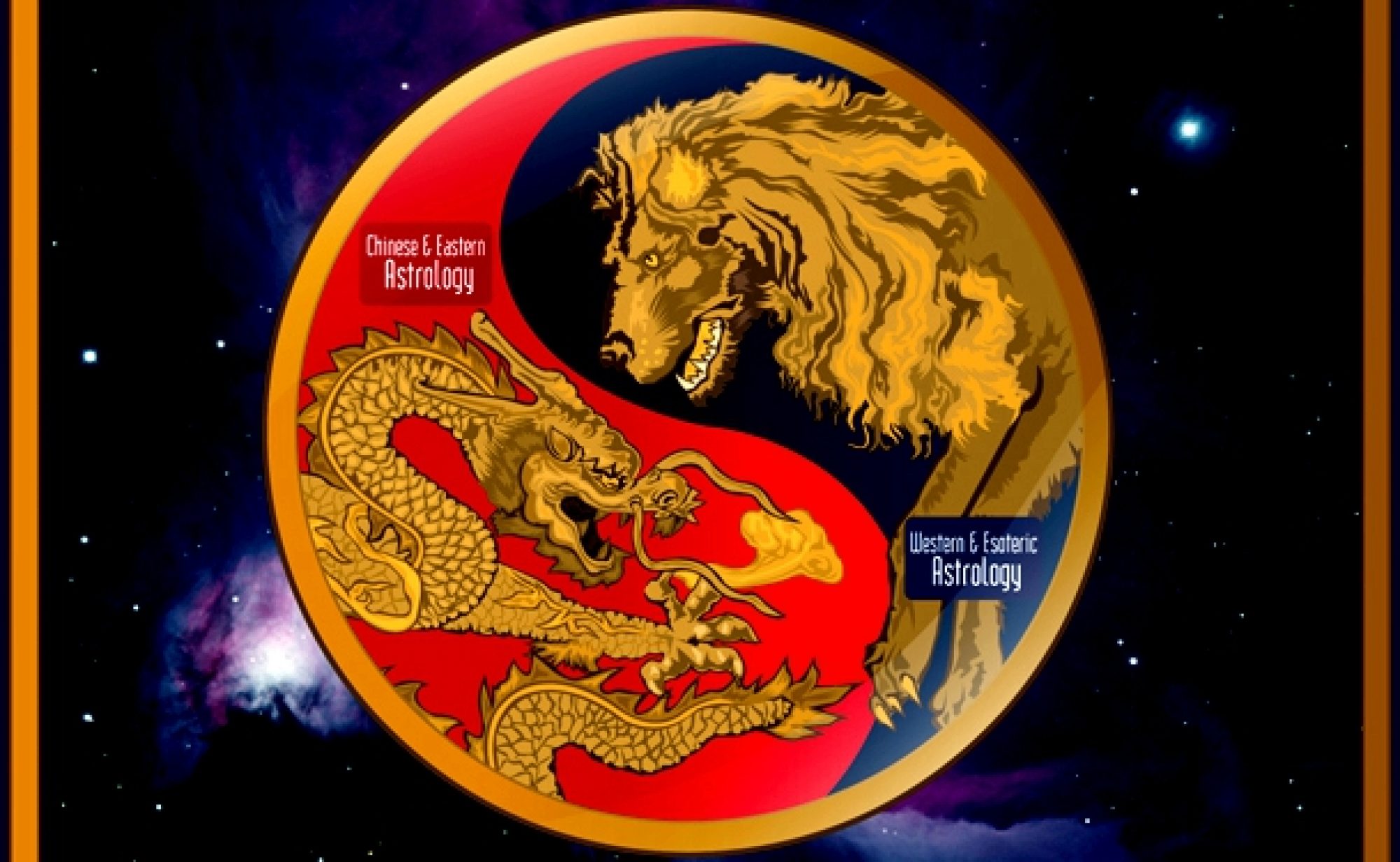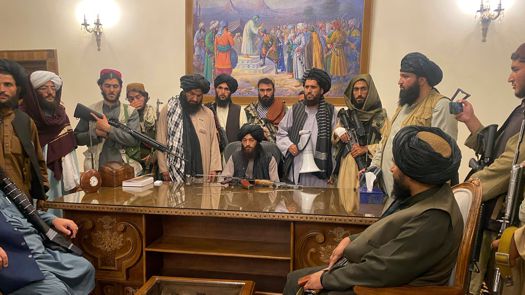Now that the dust is beginning to settle a little after these historic few days in Afghanistan, we begin this post paraphrasing the immortal words of Roger Daltrey: “Meet the new boss. He’s not the same as the old boss.” Western media is in full flight at the moment with disaster porn, frightening pictures of people falling from airplanes as they try to flee Afghanistan, sensational pictures of mobs scrambling to get on those planes, claims of people fearing for their lives under the Taliban, and on and on. To hear the media tell it, Afghanistan is facing dystopia and regression into a new Dark Ages. What is the truth on the ground there now, though? We’ll explore that here in this second part along with the astrology of the event. But we can be sure that recriminations will resound in the NATO halls of power for years to come over what was clearly an epic fail in intelligence, among other epic fails.
We’ll start with a recrimination, from one of America’s own colonels and former Pentagon advisor:
There were two salient pieces of truth in McGregor’s statements: Firstly, there was no exit strategy for Afghanistan. We know why from Part I of this post. We were not supposed to leave. Afghanistan was to be a staging post against Russia and China and a base for US corporations relating to Afghanistan’s untapped wealth. Secondly, what just happened is the end of the illusions that began in the aftermath of Desert Storm. He also stated that nothing has been accomplished where US forces have gone that have directly benefitted the American people. It is nice to hear American officials finally begin to state these things. Then, there was Biden’s speech giving his justification for pulling out of Afghanistan:
Again, more truth – the goal was never about nation-building, about creating a unified, centralized democracy. But then the lie, or the thing that will never be stated to the public directly, that the aim was to prevent a terrorist attack on American soil. The unstated reasons for going in were given by Larry Wilkerson in Pt I. Then, from 4:45 in the video, Biden states why the situation unfolded so quickly.
A 300,000 strong Afghan army had no will to fight the Taliban. For the most part the Afghan army gave up and handed over their weapons. Now the Taliban has an air force, whereas a few weeks ago they were armed only with AK 47s, grenade launchers and pickup trucks. They also probably have volunteers to fly those aircraft. It is here we pick up on the astrology of the collapse of the Ghani government in Kabul. The chart is below (bigger):

We focus first on the 2001 chart Sun, the Sun representing rulers in general. The 2001 Sun is currently receiving a direction from the Mars/Saturn midpoint, therefrom fully activated by a transit of Uranus by sesquisquare, all of which speaks to ‘intervention by a Higher Power’ or by ‘Providence’. With Uranus, events happen suddenly and unexpectedly. The direction from Mars and Saturn showed the weakness of the government at the time: “Weak vitality, the inability to meet all demands or to master all situations, the necessity to overcome illness. – The illness or the death of members of the male population.”
Next, relating to the sitting government, we find a direction of the MC to the Moon/Venus square, activated by transiting Saturn. The direction activated the resistance (Taliban). The transit gave the direction focus and clear goals, but also inhibitions to the government. The MC rules the sitting government.
There was a transit of Pluto activating the natal Mars/Saturn square, the combination pointing again to ‘intervention by a Higher Power’ as well as the ‘rage and fury of destruction’. The Pluto transit brought out all the worst thinking in the Ghani government. The ‘higher power’ in this case was the people of Afghanistan, who had finally had enough of occupation and threw their support behind the Taliban. Otherwise, the Taliban would never have made such rapid progress, with little in the way of bloodshed.
Finally, we see the directed Ascendant to natal Uranus. The populace (Ascendant) was ripe for change. From the astrology, there was not going to be another outcome. The Ghani government was going to collapse. We could justifiably call this the 2021 Afghan Revolution. We note as well the directed MC is also the direction of the Uranus/Pluto midpoint to the same place. The Saturn transit over the directed MC sealed the deal. Now we look to what is coming next.
Answering to all the pundits’ doom-saying about Afghanistan, consider this, published yesterday, from a report on the ground inside the country, from Zamir Awan, starting in Kabul:
“Life is very much normal, internet service, mobile service is functioning in a routine. Shops are opened, traffic is in normal routine, schools are opened, everything seems very much normal. The government is functioning, bureaucracy is functioning, police is functioning, just ex-president Ashraf Ghani is not in Afghanistan.”
Moving to other regional centers:
“Reports from other big cities in Afghanistan, which were taken over by the Taliban for the last many days, are reporting a very much normal life, daily routine is, as usual, ATMs are operating regularly. Women are working in restaurants, girls are going to schools, nothing changed on the ground, except the US-backed puppet government of Ashraf Ghani was replaced by the Taliban.
The general public has welcomed the Taliban and there was almost no resistance. As a matter of fact, the Taliban are true Afghani and were fighting against the foreign occupation of Afghanistan, Ashraf Ghani was only a puppet-like Dr, Najeed backed by USSR in the 1980s.
[A] Few countries [are] deliberately spreading fake news and distorting the image of the Taliban, but on the ground, the world has witnessed miracles and smooth transfer of power. A general amnesty has been granted to the public, only those who take guns against the Government will be dealt with iron hands.”
This hardly sounds like an extremist group bent on returning Afghanistan to fundamentalist Middle Ages. In fact, Pepe Escobar had the following to add:
“The Taliban did it with Islamic faith, infinite patience and force of will fueling roughly 78,000 fighters – 60,000 of them active – many with minimal military training, no backing of any state – unlike Vietnam, which had China and the USSR – no hundreds of billions of dollars from NATO, no trained army, no air force and no state-of-the-art technology. They relied only on Kalashnikovs, rocket-propelled grenades and Toyota pick-ups – before they captured American hardware these past few days, including drones and helicopters.”
Then, as to the current incarnation of the Taliban, he adds this:
“The Taliban is all about deals with tribal elders and extended family connections – and a peasant guerrilla approach, parallel to the communists in Vietnam. They were biding their time for years, just building connections – and those sleeper cells [in each of the cities]. Afghan troops who had not received a salary for months were paid not to fight them. And the fact they did not attack American troops since February 2020 earned them a lot of extra respect: a matter of honor…
…Taliban 2021 is an entirely different animal compared with Taliban 2001. Not only are they battle-hardened, they had plenty of time to perfect their diplomatic skills, which were recently more than visible in Doha and in high-level visits to Tehran, Moscow and Tianjin…
…Initial impressions point to increased maturity. The Taliban are granting amnesty to employees of the NATO occupation and won’t interfere with businesses activities. There will be no revenge campaign. Kabul is back in business. There is allegedly no mass hysteria in the capital: that’s been the exclusive domain of Anglo-American mainstream media. The Russian and Chinese embassies remain open for business. Zamir Kabulov, the Kremlin special representative for Afghanistan, has confirmed that the situation in Kabul, surprisingly, is “absolutely calm”…”
So, what are we so upset about here in the West? That question gets to the crux of the matter, because what has really taken a hit here are the illusions we have had about American exceptionalism, American ideals, the reputed strength of our military and their ability to train armies, pointing to the fact that we have completely misjudged the situation in Afghanistan and our own abilities.
Going back to the opening lines of the first part of this post, what just took place in Afghanistan has indeed been an epic fail – of intelligence, of knowledge of other cultures, of poor policy over decades, and most importantly that we (the United States) are the one indispensable nation. We have not been so before, nor will we be into the future.
What just happened in Afghanistan is not Biden’s fault, though he has been on board with many of America’s failed policies in the past, such as voting to go into Iraq. He will be blamed for it, of course, and the blame game is going on furiously in the US at the moment, with generals appearing as experts on news outlets casting blame around, when they were the very ones who engaged with the poor policies. Afghanistan has been a bipartisan affair all along. Trump would have done no better. For all his talk of wanting to end the endless wars, that was all for domestic politics, for his dream of reelection. He wanted to open Afghanistan to American business interests, which would have required American security forces. The Taliban would never allow it.
Many American and NATO military personnel and their families are rightly asking what it was all for. The troops were there often with a good service motivation, but they were used for other purposes, and those purposes not being for the benefit of the American public. They feel justifiably let down, disappointed, along with a range of other emotions. Most affected are those who lost loved ones or who suffered injuries. Some of them think we should have stayed, others thought it right we got out, that there were no other good options. The debate will go on for years, probably.
There was more than one reason we went into Afghanistan. We were motivated to do so by the events on 9/11, but there were many other unspoken reasons for doing so, as outlined previously. And after 20 years, the Asian continent is a very different place. In 2001 China was still weak, Russia was on its knees, the US was reveling in its unipolar moment and Washington thought they could do as they pleased in the world. That changed dramatically after Putin and Xi Jinping came on the scene. Iran and Syria still stand and now the big threat is seen to be China. So, if China is the big threat and Afghanistan shares a border with China, why did we leave? The answer is fairly simple – the public wanted the war to end, and Washington has lost control of Central Asia. The focus now is to stall if not push back China’s progress.
This event has damaged the credibility of the US. America is no longer on a pedestal with nations of the global south, or even among many of our allies. The Taiwanese must be looking at this in nervousness. Who can count on the US to rescue them now, watching how NATO failed to oust the Taliban? Or the Viet Cong, Or the Syrians? And so forth…Maybe military action to secure resources is not such a good idea any longer. Self-defense will always be justified, but America faces no credible threats against its shores, nor is any nation making such threats.
To add to the angst being felt in Washington, Iran’s admission to full membership in the SCO is all but assured, with Russia leading the push for admission. Afghanistan is to be an observer state. The SCO is a sort of a loose ‘Asian NATO’, meaning that if one member state is threatened militarily, all the member states contribute to the region’s security. More than that, though, full membership by Iran seals Asia as an economic zone and puts the Taliban on notice regarding issues of terrorism, drug trafficking, human rights and so on. That membership will also go far toward undoing any American sanctions. This will set Iran free to a big extent.
All the neighboring states to Afghanistan have been in talks with the Taliban under cover for years. This is another reason why the takeover of the country was so swift. Now the collective West is alarmed that Russia and China in particular will be moving into Afghanistan. What did they expect, really? They are also alarmed – the EU especially – of the potential for another refugee crisis, which may or may not happen.
In an Afghani ‘Guaidò moment’, Saleh, the former vice-president of the now-defunct Afghan regime, has declared himself the new leader of Afghanistan (machine translate) from his present hideout in Panjshir, just north of Kabul. Mostly, this would appear to be a move to forestall international recognition of the Taliban as the legitimate rulers. It may work for a while. Panjshir is the last holdout not being controlled by the Taliban. It may also become a foothold for Western interests in terms of stirring up chaos for the Taliban. If there is to be a locale for resistance against the Taliban, Panjshir would be the place. But it is doubtful there will be much in the way of outside help and it may collapse soon. It is a very isolated region, is surrounded on all sides by the Taliban and can only be supplied either by airlift or clandestinely. Massoud has declared the region to be the official resistance movement in Afghanistan. The flag of the Northern Alliance is now flying in the region. Panjshir is home to ethnic Tajik, who are historically antagonistic to the Taliban.
So, the road to governance of Afghanistan by the Taliban will not be paved with lapis lazuli. There is still much to overcome, not the least of which is the stigma attached to the group. But initial appearances are that the group is certainly more moderate than the Taliban of 20 years ago. And, they are noticeably steering clear of antagonizing anyone, especially American interests still in the country, such as the TAPI pipeline.
The Taliban just gave a press conference (video, with English voiceover) where they outlined their policy and desires for the nation, such as guaranteeing a general amnesty and the rights for women, as well as outreach for foreign investment and help with infrastructure. Many people would be justifiably skeptical of the words, and only time will tell if they are true. However, certain realities need to be kept in mind.
Afghanistan and the region are quite different than they were 20 years ago. 20 years the Taliban at the time were extremists and funded by the West (that is not the case now) and the West under the US was the sole superpower. The difference is stark, considering Russia, China and Iran, and we see how rapidly the world has changed. The Taliban of today recognize these changes and know if they want to stay in power they have to reach out and cooperate with foreign powers. To do so, they cannot adopt extremist policy. They know they have to be removed from the international terrorist blacklists.
There is a ray of hope for the people of Afghanistan – regardless of the hysteria of Western media – and cautious optimism, but the solutions for the nation will be an Asian solution, by Asians, and that includes Russia. We can help, of course, but just not militarily.
The Americans and the West have left the country to the Afghans and their own devices. It is being seen as abandonment by the West. In one sense we have abandoned Afghanistan. But how else would it have been had we tried to stay? Some of the billions in aid we sent there ended up in suitcases outside the country, if that is any indication. Overall, with the help of neighboring states and investment, over time Afghanistan may become very prosperous. Who can say?
It will take years if not decades to bring Afghanistan and its people to prosperity and modern standards. That was clearly not happening under Western occupation. Of great value to the West, however, has been the breaking of the illusions with which our media bombards us. This episode, along with others in recent memory, will make us more wary of ‘spreading freedom, democracy and Western values’ to nations and cultures we neither understand nor who necessarily want them. We made many fundamental errors in Afghanistan. Let us take them as lessons into the future. For now, we hold the thought that the people of Afghanistan will come to find peace and prosperity into the future, on their own terms, regardless of what we think of the Taliban. As to the Taliban, we’ll see if they can walk their talk.
Featured pic from New York Times

